|
|
|
Sort Order |
|
|
|
Items / Page
|
|
|
|
|
|
|
| Srl | Item |
| 1 |
ID:
162097
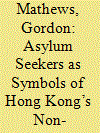

|
|
|
|
|
| Summary/Abstract |
This article discusses the situation of asylum seekers in Hong Kong and how it has changed in recent years. Hong Kong treats asylum seekers relatively well compared to some other societies, but at the same time, the chance of being accepted as a refugee is virtually zero. Although it is illegal for asylum seekers to work, it is virtually impossible for them not to work given the miniscule government support they receive. Amidst government neglect, asylum seekers have emerged as heroes among some Hong Kong young people after the Umbrella Movement. Whereas in years past, asylum seekers were generally ignored or looked down upon by Hongkongers, among some youth today, asylum seekers have emerged as symbols of Hong Kong’s non-Chineseness.
|
|
|
|
|
|
|
|
|
|
|
|
|
|
|
|
| 2 |
ID:
120033
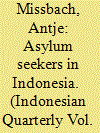

|
|
|
| 3 |
ID:
165351
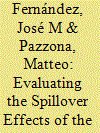

|
|
|
|
|
| Summary/Abstract |
The Colombian civil war lasted for nearly six decades with approximately 10 percent of its population being displaced over the same period. The implications of this conflict have transgressed international boundaries. Countries such as Ecuador experienced an exodus of victims as well as an increase in the presence of armed groups, along with the proliferation of illegal businesses. Even though the internal social and economic consequences of the Colombian conflict have been documented in the literature, there is yet to be a study addressing these issues from the perspective of impacted neighboring countries. In this work, we contribute to the literature by evaluating whether the influx of asylum seekers and the increasing presence of armed groups in the bordering provinces of Ecuador have lead to an increase in violence among these provinces. We do not find any link between the arrival of asylum seekers and the incidence of violent crimes in the Ecuadorean bordering provinces. Similarly, our results indicate that despite an increase in the presence of armed groups, these regions did not experience an increase in the homicide rates significantly different from the other provinces. The results are robust to various specifications and econometric techniques.
|
|
|
|
|
|
|
|
|
|
|
|
|
|
|
|
| 4 |
ID:
172238
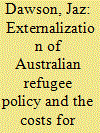

|
|
|
|
|
| Summary/Abstract |
This article argues that Australia’s increasingly externalized refugee policy harms queer asylum seekers and refugees. Australia’s refugee and foreign policies perpetuate colonial and homophobic relations with states such as Indonesia, Papua New Guinea, and Nauru to meet Australia’s border security priorities. The lack of recognition of queer people in Australia’s foreign policy and the harm caused by its regional refugee policies represent a clear contradiction to Australia’s claimed liberal human rights diplomatic position.
|
|
|
|
|
|
|
|
|
|
|
|
|
|
|
|
| 5 |
ID:
108146
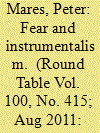

|
|
|
|
|
| Publication |
2011.
|
| Summary/Abstract |
Immigration and border protection policies are driven by national interest. However, the national interest can be more broadly and more narrowly conceived, depending in part on the degree to which the future of the individual state is understood to be contingent on a shared global future and on the recognition that the short-term costs of international cooperation may bring long-term collective benefits. Whereas such global interdependence is recognised in international statecraft in the domains of aid, trade and climate change, such recognition does not extend to immigration. Australia's national policies towards human movement from the Global South tend to be driven in large part by exaggerated fears (of unregulated border crossings) or a narrowly instrumental approach to the economic benefits of human capital transfers (migrants filling skills gaps and providing flexibility in the labour market). A broader conception of migration would take into account the potential developmental benefits of human movement for source nations and for migrants themselves.
|
|
|
|
|
|
|
|
|
|
|
|
|
|
|
|
| 6 |
ID:
142530
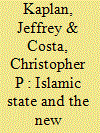

|
|
|
|
|
| Summary/Abstract |
This article focuses on the apocalyptic zeitgeist of the Islamic State through the lens of what we call the New Tribalism. It finds that IS emerged from the Al Qaeda (AQ) milieu, but soon split with AQ as the messianic excitement surrounding Al-Baghdadi and his teachings grew. In common with previous millennial/messianic movements in all three “Peoples of the Book”—Judaism, Christianity, and Islam—IS soon evolved beyond the laws of the normative faith (antinomianism). We hold that for this reason, despite its claims of faith and fealty, IS has left the Islamic Umah behind, becoming a malign sectarian group of its own whose dynamism and successes are attracting a global audience and support from Muslims in almost every country. This helps to explain such abhorrent practices as forced conversion, sexual servitude, the destruction of historic artifacts, and mass executions. We find that the American invasion of Iraq was the vital first step in a series of events, which gave birth to IS. A thorough review of IS history and political culture traces these historic moments in time.
|
|
|
|
|
|
|
|
|
|
|
|
|
|
|
|
| 7 |
ID:
157502
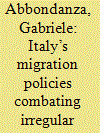

|
|
|
|
|
| Summary/Abstract |
Italian migration policies combating irregular immigration from the early 20th century to the present times have been increasingly debated and controversial. Four phases are detectable: the absence of a legal framework while Italy was still an emigration country, the first regulations of the 1980s, policies influenced by both the European integration process and the increase in immigration until 2002 and, lastly, the country’s controversial approaches since 2004. What is noticeable is a dichotomy in Italy’s migration policies, with generally consistent internal measures and often contrasting external ones.
|
|
|
|
|
|
|
|
|
|
|
|
|
|
|
|
| 8 |
ID:
139288


|
|
|
|
|
| Summary/Abstract |
This paper examines recent developments in refugee policy in the Republic of Kazakhstan. Specifically it considers the context of adoption of policy output—the Refugee Law—and Kazakhstan’s compliance with international commitments on providing socioeconomic support to refugee community. The analysis reveals that ratification and subsequent steps to put international policy into practice in this particular case are symbolic gestures to gain legitimation in international society without actually aligning the domestic legal system with international commitments. Although the Refugee Law appears to grant rights and protections consistent with international accords, it does so only superficially as these are undermined by a complex set of national laws and policies that have precedence over the Refugee Law. Only after the Refugee Law was adopted, Kazakhstan under intensive pressure of international organizations started slowly bringing its refugee policy into actual compliance with international standards. The process, even though important, has proved to be very slow, cumbersome and only piecemeal and in reality has amounted to walking in place.
|
|
|
|
|
|
|
|
|
|
|
|
|
|
|
|
| 9 |
ID:
176234
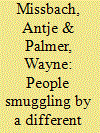

|
|
|
|
|
| Summary/Abstract |
The decline in the smuggling of people from Indonesia to Australia since late 2013 is primarily attributable to unilateral deterrence policies under Australia's Operation Sovereign Borders. When seeking to prevent asylum seekers from coming to Australia to enjoy the right to asylum there, the Australian government has tested a number of deterrent mechanisms that sometimes border on illegality and even state crime. In May 2015, for example, Australian authorities intercepted an Indonesian boat carrying 65 asylum seekers and allegedly paid the six smugglers to return their passengers to Indonesia. In this article, we reconstruct what happened at sea, and put forward a number of arguments that categorise this ‘turnback’ as explicitly-commissioned people smuggling against Indonesia. Our article also points to further implications about looming risks if the policy was to be employed more widely by states in other areas of the world where people cross the sea to seek asylum. Not only would the practice severely undermine international collaborations that have developed to prevent and combat people smuggling, but it would also create additional safety risks for those who are turned back.
|
|
|
|
|
|
|
|
|
|
|
|
|
|
|
|
| 10 |
ID:
145724
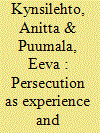

|
|
|
|
|
| Summary/Abstract |
This paper adopts an ontological perspective toward asylum interviews. The suggested take refers to the incompatibility of different knowledge systems and experienced worlds between asylum seekers and asylum officers. With such a focus, we sketch the parallel functioning of knowledge-claims anchored in two radically different ontological principles. Our analysis starts with the body as a site and source of knowledge through which we critically examine the limits of knowledge sought after in asylum politics. The ontological gap reflects the divide between meaning and significance, self and other, which this paper seeks to mediate through feminist methodologies and ethnographic insight. We suggest that asylum seekers do fill the ontological gap, but not in ways anticipated by governmental practices; their bodies and stories adopt alternative ways of identification and taking action. Thus, the gap is an opening for conceiving different knowledges and knowledge practices within asylum politics and international relations.
|
|
|
|
|
|
|
|
|
|
|
|
|
|
|
|
| 11 |
ID:
117889


|
|
|
|
|
| Publication |
2013.
|
| Summary/Abstract |
Drawing on research with Gambian female asylum seekers in London, who are claiming asylum on the basis of the threat of forced female genital mutilation, this article examines their narratives of self-production in the asylum claims process. Refuting representations of asylum seekers as victims of such a process we argue that they must be seen as partly complicit in the production of a victim identity, as they assume the identity of victim to verify and strengthen their narratives. By focusing on the production of victim identities, we seek to problematise Western liberal notions of agency. We argue that recognition of a claim entails the representation of the claimant as victim of a 'backward' practice and patriarchal society, thereby feeding into Western feminist accounts of oppressed 'third world' women. It is within these 'historically specific relations of subordination' that female asylum seekers exercise their agency.
|
|
|
|
|
|
|
|
|
|
|
|
|
|
|
|
| 12 |
ID:
174035
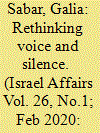

|
|
|
|
|
| Summary/Abstract |
Israeli society is complex, multifaceted, heterogeneous, pluralistic, hectic and loud. Yet, as this volume claims, within this cacophonic arena, islands of silence and pockets of voicelessness remain. Obviously, not all of these could be addressed in this volume, leaving some unexplored: the voices of those suffering from terminal illness, of elders subjected to ageism, of the fat and the disabled, of the LGBT community and of non-Jewish migrants in Israel, to mention but a few that are not commonly heard. This article offers some insights into these unrevealed realities, mainly of those ‘seethrough’ sectors such as labour migrants (usually called foreign workers) and asylum seekers.
|
|
|
|
|
|
|
|
|
|
|
|
|
|
|
|
| 13 |
ID:
138161
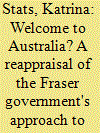

|
|
|
|
|
| Summary/Abstract |
The Fraser government's response to the Indo-Chinese refugee crisis and the presentation, for the first time, of asylum-seekers arriving in Australia by boat is almost universally acclaimed as having been proactive, generous and humanitarian in spirit—the antithesis of both the preceding Whitlam Labor government and subsequent governments, particularly since 2001. Adopting a policy of ‘forward selection’ of refugees from camps in South-East Asia, the Fraser government was able to stem the flow of boats and oversaw the relatively uncontroversial resettlement of nearly 70,000 Indo-Chinese. However, the author argues that this was not the brave and principled course of action for which Fraser and his immigration ministers are regularly fêted, but rather a delayed response that was motivated by fear and desperation rather than pure humanitarian intent. The celebrated outcomes of Fraser's policies belie the self-interested way in which they were constructed and neglect the fact that the government did not act until it was forced. Fraser's policies were neither a departure from the past nor the antithesis of current polices; to the contrary, they were the seeds of the contemporary Australian model of asylum.
|
|
|
|
|
|
|
|
|
|
|
|
|
|
|
|
| 14 |
ID:
101515


|
|
|
|
|
| Publication |
2010.
|
| Summary/Abstract |
Asylum seekers can be considered some of the most vulnerable people in the world, yet this article demonstrates that in advanced industrialized states, exemplified by the UK, they are constructed as a homogeneous collective that threatens state interests. This article examines the construction of asylum seekers as a threat that is evident in British narratives. Building on works by critical security scholars, this article examines the process that led to asylum seekers being portrayed as a threat in the UK. The empirical research focuses on narratives that give insight into sentiments towards asylum seekers in the UK. Government policy, political statements and the mass media are considered. The nature of the threat examined is threefold and takes into account traditional security studies, economic or subsistence security and societal identity security.
|
|
|
|
|
|
|
|
|
|
|
|
|
|
|
|
| 15 |
ID:
142486
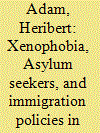

|
|
|
|
|
| Summary/Abstract |
In the context of Germany's anti-Semitic past, current attitudes towards refugees and immigrants are surveyed and compared with other countries. Higher levels of xenophobia in former East Germany, despite far fewer foreigners than in West Germany, is explained with the official denial of the fascist legacy, in contrast to an effective reeducation policy and dealing with the Nazi past in the West. Islamophobia and allegations of welfare tourism have now emerged as the main obsession of xenophobes. Yet, overall attitudes towards outsiders have improved, together with legislative changes in immigration policy and citizenship acquisition, the weekly anti-Muslim demonstrations by PEGIDA (Patriotic Europeans) in Dresden and arson attacks on asylum homes notwithstanding. Younger and better educated Germans are far less xenophobic. This analysis portrays the current German public discourse, provides relevant statistics on immigration, explores contested integration/asylum policies, scrutinizes implications of categories from the cultural repertoire through which migrancy is understood and assesses the contending political forces.
|
|
|
|
|
|
|
|
|
|
|
|
|
|
|
|
|
|
|
|
|